Our Chilean Adventure
We are home safe and sound now, just in time for Snowzilla. Because you had the patience to follow my erratically posted entries in this blog, I thought it would only be right to offer my thanks in the form of a final post on what I actually went to Chile to do – study the school feeding program. I study school feeding as a set of practices that has the potential to either diminish or exacerbate inequality. Done right, amazing things happen. Done wrong, ultra-processed food products on styrofoam trays serve as yet another disadvantage for kids to overcome.
By “done wrong,” I primarily mean done with the involvement of large corporations. This is not a stance I assert flippantly. Providing meals for millions of kids every day is very difficult work. It’s hard to organize, hard to coordinate, and hard to execute. Businesses are good at these sorts of things. They make sure food products
Ivy Ken
22 chapters
Chile Wrap Up
Washington, DC
We are home safe and sound now, just in time for Snowzilla. Because you had the patience to follow my erratically posted entries in this blog, I thought it would only be right to offer my thanks in the form of a final post on what I actually went to Chile to do – study the school feeding program. I study school feeding as a set of practices that has the potential to either diminish or exacerbate inequality. Done right, amazing things happen. Done wrong, ultra-processed food products on styrofoam trays serve as yet another disadvantage for kids to overcome.
By “done wrong,” I primarily mean done with the involvement of large corporations. This is not a stance I assert flippantly. Providing meals for millions of kids every day is very difficult work. It’s hard to organize, hard to coordinate, and hard to execute. Businesses are good at these sorts of things. They make sure food products

arrive on time so that no one goes without. They make sure the process is efficient so that no money is wasted.
Or at least that’s what we believe companies are doing. In fact, they’re less good at these things than we might think, not because they’re incapable but because they sometimes engage in fraudulent, collusive, and corrupt practices. This is not my opinion – in the realm of school food service providers, it is repeatedly documented. And it may be surprising that this goes on regularly in the United States, in Chile, and in other parts of the world where companies such as Sodexo, Aramark, and Compass Group operate. For those three companies alone, that’s more than 60 countries.
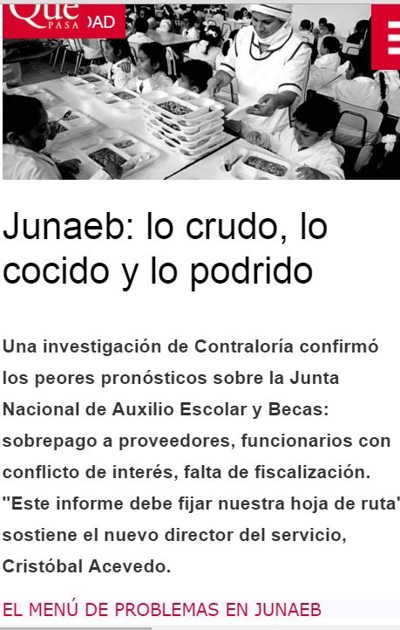

But let me pause here for a minute and cut to my bottom line. What I have learned in Chile—and I’ll tell you why—is that small efforts matter. It bears repeating: All those little things you do to help make your kids’ school food better are vital. Honestly, just showing up at school to eat with your kid once in a while matters. This is school food “done right.”
I haven’t always felt this way. In fact, over the last few years I’ve been pretty despondent about the little things people do. And by “people,” I sort of mean me. I tried to get a little wellness team going at my kids’ school and nobody ever showed up or cared about what was going on. In part this is because I’m too shy to recruit people, in part because I’m not as effective as I imagined, and in part because people just have a lot going on. One morning when I was up at 5AM pre-blending buckets full of smoothies made from the spinach in the school garden, I just looked at the mess around me and thought, “What am I doing? Why would any sane person bother with this? Who

cares about Spinach Smoothie Day?” (Yes, this was a holiday I made up myself. See what I meant about my effectiveness?)
Over the course of my time in Chile, I am really happy to say I found answers. Now I know what I was doing, why I bothered, and who cares.
THE WAY THINGS ARE
The answer is long, though, so stick with me for a minute. It starts with the way things are. There are really powerful forces invested in the way things are. That’s sort of a tautological statement, because part of the way those “forces” have become so “powerful” is that they’ve been able to define how they want things and make them happen that way.
One horrific example of this is the 1973 military coup in Chile. Salvador Allende, a long-time leftist socialist, was sort of amazingly elected to the Presidency through rigorously democratic elections (or, what I really mean by that is through elections that various

opposition forces tried very hard—unsuccessfully—to fix). Say what you want about his policies, his stances, his actions (I say, “Yay!”). The fact to focus on is that he was elected by the people of his country according to the democratic principles laid out in the constitution. Capitalists in the United States were horrified by his election because it indicated that (1) access to their supply of natural resources like copper would be limited, (2) Chilean demand for products from US and multinational production and distribution companies would go unmanufactured, uncultivated, and unrealized, and (3) the wild idea that capitalism is not the only way to go might spread. These eventualities were so scary that these capitalists were able to convince the highest levels of the US government to intervene in Chile to overthrow this President. The US now admits as much. By orchestrating, financing, and supporting Augusto Pinochet’s military overthrow of Allende, the government of the United States, primarily via the Central Intelligence Agency, participated in the murder and torture of elected

officials, poets, demonstrators, activists, and thousands of regular people.
Yes, this is an extreme and horrific example. But it’s also true. For 17 years, Chileans could not vote. Were not represented in congress. Could not speak freely, write freely, or even broadcast music in their native languages. During this time, Pinoche relied heavily on “The Chicago Boys” – economists from the University of Chicago who made sure the country turned outward rather than inward. They really started the whole phenomenon of “neoliberalism” that you may have heard of, where a country that grows food exports it rather than uses it to feed its own people; where a country opens itself up to the world market; where a country’s workers and peasants have few rights compared to owners and elites.
So this is the way it is in Chile. All this started happening over 40 years ago, and because it

happened at all it continues to shape the economy and political system of this nation.
This has not happened in the United States, but that’s because enormous effort has gone into not allowing leftist or socialist candidates to be elected at any level in the first place. (Check the Koch brothers’ increasing influence in small, local political races.)
So things are the way they are. And they are that way because people (e.g., Henry Kissinger, Jamie Dimon) and institutions (e.g., corporations, governments) find it really important for them to be this way.
It’s not an accident that things are the way they are. It didn’t happen because the best ideas percolated up in a democratic wonderland. Things are the way they are because powerful people and institutions need them to be this way, if those powerful people and institutions are going to be able to do what they want to do.
What is it they want to do so badly?
“Make money, money, make money, money, monaaaaay.”
And so what I want to make clear with this example that some of you will find wacked and others will find ho-hum-no-duh is that when anybody tries to change something about the way things are, they’re up against some pretty powerful foes. Foes that use lots of money to counter those attempts. Foes that are very well-organized and smart. And, not to be dramatic, but foes that don’t mind killing and overthrowing governments.
Hey, hey, hey, I thought we were talking about school food here. Killing? Coups? Come on.
“THAT’S NASTY”
Okay, let me get back to the immediate topic. Somebody correct me if I’m wrong when I say this: School food sucks. Right? It’s horrible. It’s chicken nuggets and pizza, pretty much every day. It’s airplane meals and tasteless mush. Maybe it has gotten better, or maybe people think that since the Healthy Hunger-Free Kids Act of 2010 it has gotten worse.
It’s horrible in Chile, too. If you’ve ever worked in a school lunch room in the US since about 1985 you might be familiar with the huge slotted racks where frozen trays of pre-made meals are stored, and the ovens that are magically the

same size so that these racks can just be wheeled or lifted from the freezer to the cooker. Chile has its own version of this, called (with Spanish accent) “Cook & Chill.” In this system, the pre-cooked food comes in plastic bags. The job of the cafeteria workers is to boil enormous pots of water, place the frozen bags directly in the water, and then squish the contents out once they’re warm.
I spent a lot of time with these women, these cafeteria workers, when I was there. Their job title is manipuladoras de alimentos, or “food handlers.” Not cooks, because they aren’t allowed to cook. Not bakers, choppers, recipe designers, or anything else. Just “handlers,” because it is most efficient for the companies that hire them to keep their individuality, creativity, and skill out of the process of getting the pre-made food from the freezer to the students’ trays. It’s all standardized and measured, and it’s very difficult to mess it up.
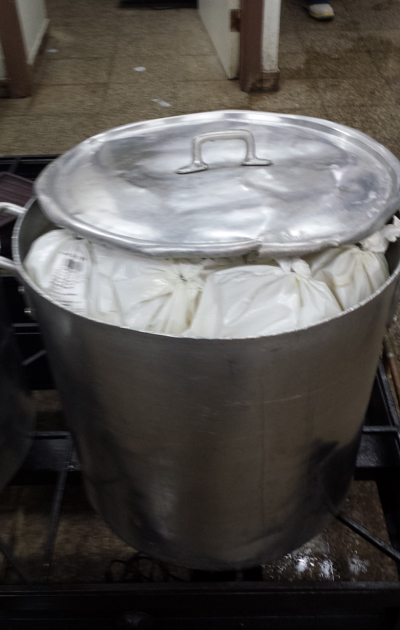
It’s also very difficult to eat. The “food” is gross. One day it might be rehydrated potatoes with a tuna sauce on top. Another day, white rice with beef sauce. The government claims that about 1/5 of the food is thrown away. A recent Chilean news segment estimated that it’s closer to 50%.
Now keep in mind that this is happening in the country that ships you most of the raspberries, strawberries, blueberries, avocados, grapes, salmon, trout, plums, applies, and cherries you eat.
SO WHY IS IT LIKE THIS?
The CIA has not (to my knowledge) infiltrated the school feeding program in Chile in service to capitalist interests. It has not overthrown a democratically elected school feeding system and replaced it with an authoritarian feeding regime.
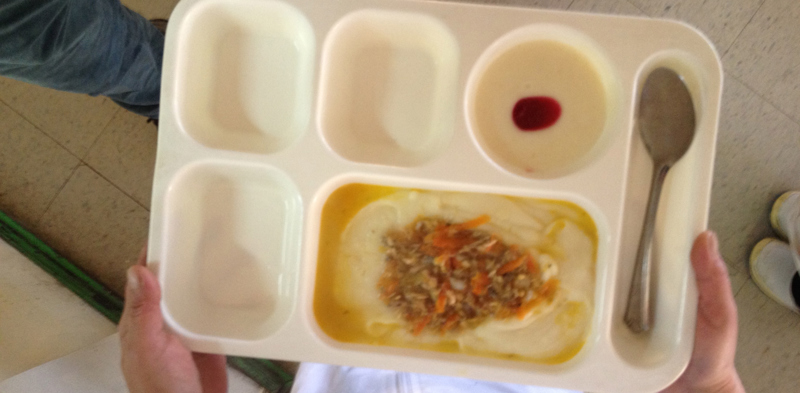
And yet, kids are served this kind of food because it is in someone’s interest. I will not—cannot—point to a single person, because it’s not about a single person. It’s about things getting set up in a way that serves some interests at the expense of others. The interests that are not being served are children’s, and especially vulnerable children’s. The interests that are being served here are capitalist ones. Company interests. This is because companies are the lynchpin of the whole feeding system. While kids in Chile used to be fed without the assistance of food service companies, the system that has been in place for over thirty years relies solely—100%—on these companies for the provisioning of kids’ food.
It’s sort of ironic that this feeding system was put into place to combat corruption – the very kind of thing I’m critical of. After a big fraud and corruption scandal in the 1980s, the government determined that it needed to implement an objective, computer-based auction system to match up food service companies with schools. These food service contracts are big money (BIG money), so it had become pretty tempting for government officials to catch a little cash on the side by awarding the contracts to the most, shall we say, “generous” companies. The linear programming model they adopted simply sorted out variables as 1s and 0s and made corruption much more difficult to accomplish.
But what this did was set up every school in the country to be served by a company. Right now that’s 16,000 schools. The government pays these companies US$1 billion a year to administer this program. Did I mention, this is big money?
When profit-maximizing companies are in charge of feeding millions of school children, the feeding program is going to take on particular contours. It is going to employ manipuladoras rather than training cooks. It is going to serve the heated contents of frozen, standardized bags rather than providing local, seasonal, cooked food. It is going to endure the nefarious practices of companies that would deliberately make their food offerings taste bad so that fewer children would participate in the program during the contract period, kicking in a per-meal reimbursement increase for the company. That sort of thing.
WEREN’T YOU TALKING ABOUT SPINACH SMOOTHIES OR SOMETHING?
And this is why it matters that you get up at 5AM to blend smoothies or volunteer to do a cooking demonstration in a school. The forces that have set things up the way they are have both might and inertia on their side. They’re big and powerful and they’re already there doing their thing, so the most likely thing to happen is that they stay in place and keep on doing their thing. And while it’s possible that a decree will come down from above and demand that all school food service companies immediately be forsaken so that local, organic farmers and chefs can step in to give kids the food they so richly deserve, it isn’t likely.
So then the spinach smoothies don’t matter, right? In the face of billion-dollar companies entrenched in the system by linear programming models under a neoliberal government supportive of capitalist enterprise, who cares whether a few kids get to taste spinach from the school garden?
That’s the question I’ve been gnawing on for quite a few years. It’s a good question. It’s a real question. It’s a sociological question, in that it’s focused on the social structures that constrain local action.
But here’s what I figured out in Chile. One, nothing is ever going to happen without small-scale, local action. This is a certainty. And two, small-scale local action is really the end goal.
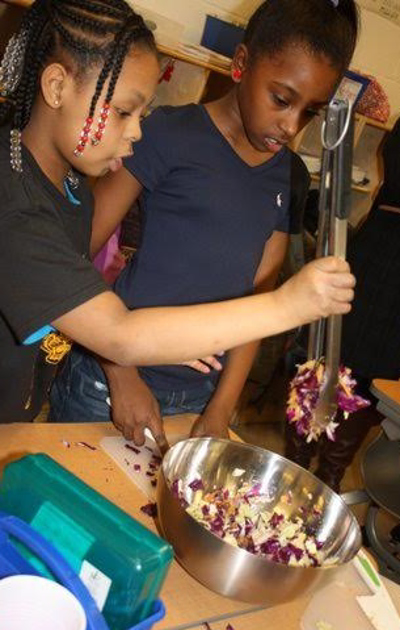
I’m old now, and I (sadly) no longer believe I can make the world fair and just. There are horrible things that have been going on throughout history and that will keep happening today, tomorrow, and the next day. I want to get rid of inequality, for sure. But I no longer understand that to be a destination. It’s not as though we can fix things once and for all, and then sit back in our lawn chairs and drink margaritas.
We. Need. Constant. Vigilance. The forces that would overthrow a democratically elected government in order to make the world safer for capitalism are not suddenly going to stop their dirty tricks and say, “Whoa, we really need to back off here.” They’re always going to keep going, keep morphing, keep trying. Similarly, albeit at a much less extreme level, the interests that are served by giving kids boiled bags of yuck instead of good food aren’t suddenly going to say, “You know, it’s not so important for us to maximize profit. What are important are these vulnerable kids.” Serving cheap, boiled food is

what they do. And in the case of Chile, these companies are enabled by a government that rewards bids with the lowest possible food prices. So whether any individuals in the companies are “good-hearted” or not, they have institutional pressure and incentive to continue with their current practices. Changing things, then, is a marathon. An ongoing, longer-than-life marathon. And what we must do is engage in it all the time in every big or small way we can think of, and simultaneously train each other and each next generation to continue the fight. This is not a fight against people, but rather, a fight against practices that do not serve the interests of a society’s most vulnerable members.
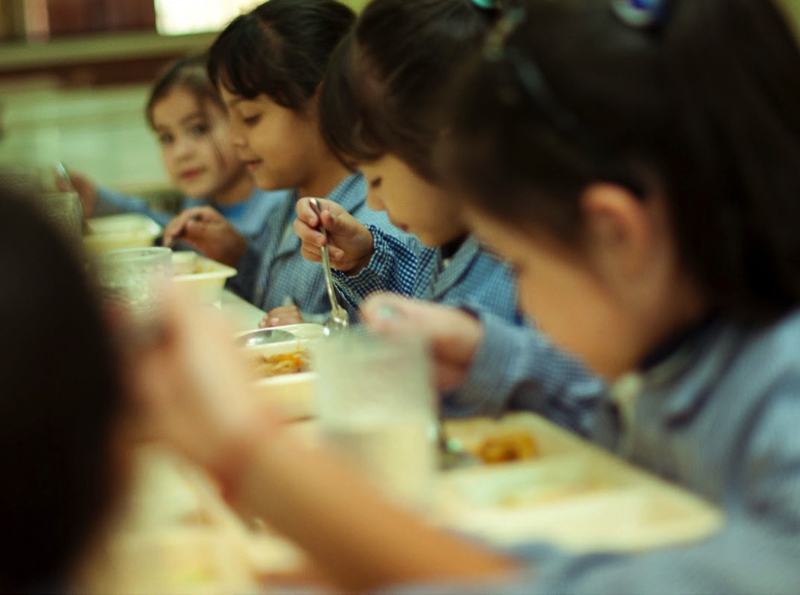
WHAT IT WOULD LOOK LIKE
Let’s say no mother ever went to her kid’s school in Santiago at lunchtime and said, “This food is really bad. Can’t we do something about this?” Let’s pretend no rural, organic farmer in Paillaco ever took the trouble to comply with a pilot program to get her carrots into the supply chain for the town’s school. Let’s imagine that no principal in Castro ever found funding to plant a school garden with a dozen varieties of potatoes that are native to the island.
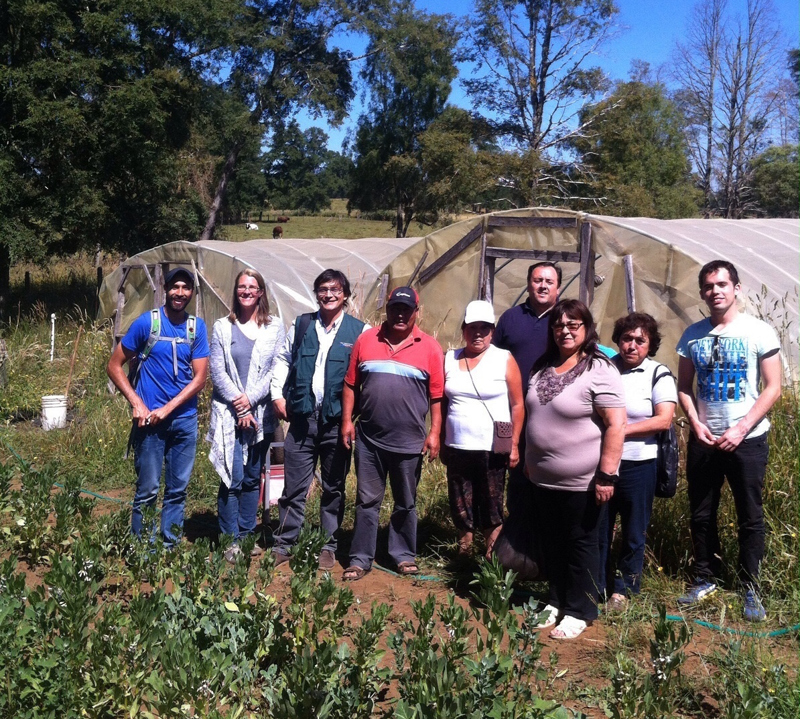
The food would never change. The organic carrots would never show up. The potato varieties would go unplanted and untried.
Now let’s imagine that some magic edict did come down from on high to solve all school food problems. How would the issuer of the edict even know what to demand? My research assistant and I met with the highest government official in charge of Chile’s school meals. He was surprised to learn that anybody in Chile cared about getting local food into the country’s school food supply chains. He said it was important to protect companies’ rights. He is a bureaucrat, charged with administering a complicated, high-budget national program. When we asked him what his vision was, since he had just stepped into the job a few months before, he told us how important it would be for the agency to get some new meal tracking software, and for all government employees to do a better job of documenting their meetings with company representatives. His vision. That’s his vision. Out of his own mouth. A computer system and some additional bureaucracy.
There are very few small-scale, local actions going on in Chile to address the problems of the school feeding program, at least as far as I was able to tell. That’s not to say there are none, but some people there believe that the political repression Chileans have endured has paralyzed them into inaction, even over issues of food within agricultural regions. They have well-founded and genuine fear about political participation and government critique. So even if the director we met wanted to overhaul the system, he would have no one to turn to. No ideas that have been tested over a few years at a handful of schools. No pilot programs in place to gauge. No coordinated movement that has done the research, taken things into its own hands, tried something different, and worked out the kinks. There are no Spinach Smoothie Days in Chile. Or at least, there aren’t many.
We did meet some enormously inspiring people who are not currently involved in the school feeding program but who have the capacity and desire to be. The country, whose latitude extends from 17-degrees to 56-degrees South, is certainly climatologically equipped to provide a wide variety food for its own children’s school meals. There is reason to hope, if not a wealth of current examples to draw on.
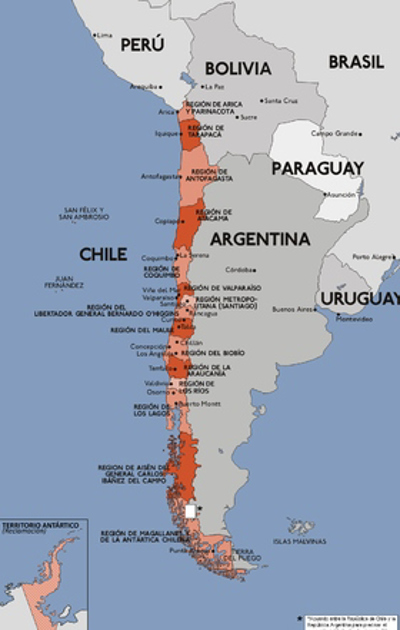
KEEP YOUR EYES ON THE PRIZE – OH, WOW, IT’S RIGHT HERE!
But doing small-scale things in the hope that they provide material for larger-scale change is only one reason why Spinach Smoothie Days matter. The other reason is that the Day, itself, is the whole end goal.
The good work that is going on in the United States around school food is really multifaceted, and, frankly, hard to keep track of. For every Spinach Smoothie Day there’s a garden work day, a Food Prints cooking lesson, a sweet potato taste test, and a decision to take chocolate milk off the menu. In the US, the Farm To School Network has connected students and farmers in 39 states; the
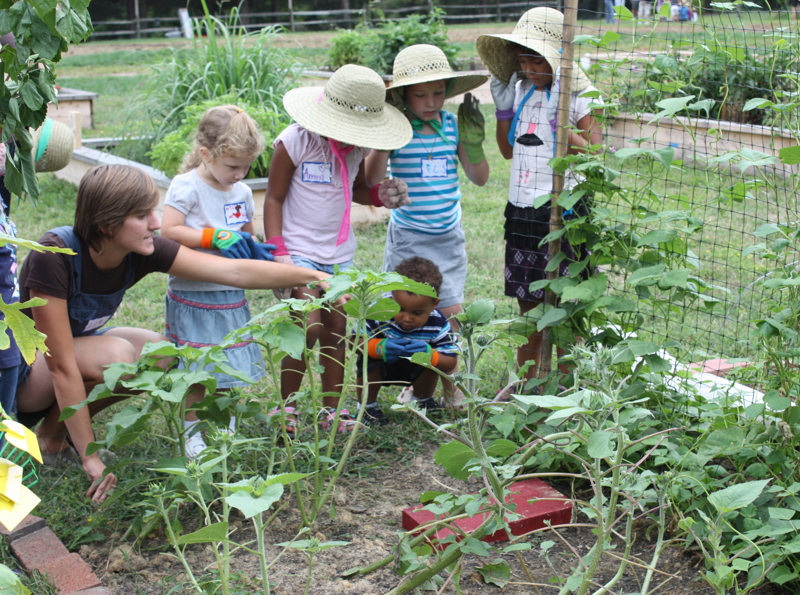
Food Literacy Center in Sacramento manages a 2.5-acre student garden; and initiatives like Alice Waters’ Edible Schoolyard Project have measurably changed the way students eat. I could go on for days. I used to be overwhelmed and, honestly, sort of annoyed by all this activity. I kept thinking, “Why are these people wasting their time? Don’t they realize there’s no edict coming? Don’t they realize we’re doomed unless all this activity is coordinated on a national level and scaled up?”
Now I realize how foolish my attitude was. This messy, idiosyncratic, local activity IS ITSELF the goal. Every local area has its own climate, its own food, its own economy, its own strengths and its own weaknesses. Who knows better how to deal with all those than the moms, sustainability advocates, farmers, and cooks from those very areas?
If an edict did come down in either country, what it might ideally say is, “Each local area should have the support it needs to supply meals to
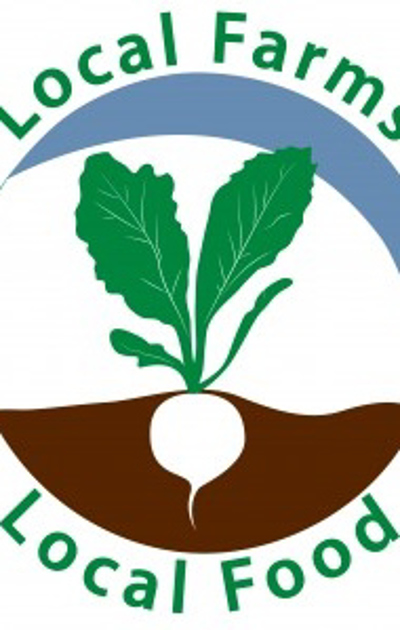
students in the ways that best conform to the principles of sustainability, health, and pleasure there.” This is not some libertarian manifesto. It’s an acknowledgement that the United States and Chile are large geographical places and the localities they span are unique. These areas are filled with people who have the knowledge and skills to make school food there great. And if such people do not emerge, they can be sought out and trained in ways that prioritize the local sources and customs from which they can draw. To the extent that resources can be sustainably shared across areas, great, let’s share them. But each area needs to develop its own strategies, and this effort should be cultivated.
Yep, it’s going to cost money. But let me remind you that the current system also costs money, and much of that money is being syphoned off by large multinational companies. (Again, I’m not making this up. It’s a matter of public record in both the US and Chile. Check Washington DC’s recent whistleblower kerfuffle with a company called Chartwells.) Others have made terrific arguments for why it’s sane, prudent, and right to fund a robust school feeding program – anywhere. And while the perfect program would certainly have some national character and be supported by federal dollars, it is local farmers, local chefs, local kids, and local parents who would compose the centerpiece.
GO DO IT! AND KNOW THAT IT MATTERS
Large, powerful interests are always going to be plotting, working, and sometimes succeeding in setting things up in the ways that are most beneficial for them. They’re doing it now, and they’re going to do it long after we die. So what we need to help each other with is developing the will and skills to have constant vigilance. To always question. To always bring things up. To agitate and cause a scene if need be. And to blend smoothies at 5:00 in the morning. Because that’s not just the groundwork for the final edict (as nice as that would be). It’s also the end goal.
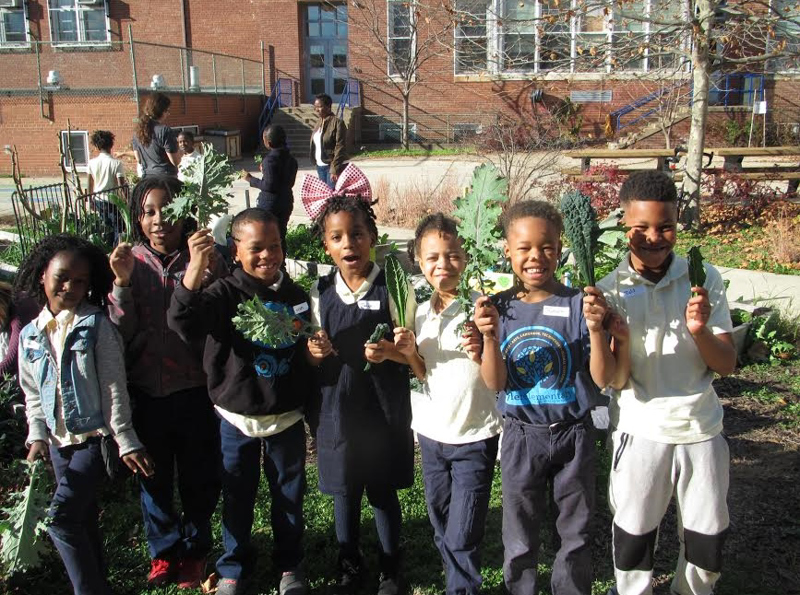
THANK YOU, FRIENDS
Whether you made it this far or not, I appreciate your traveling along with me on this journey – through Chile, through my work, through my family’s adventures, and through a few little pieces of my heart.
1.
At the Consulate in DC
2.
Bus Reservations Stress Me Out
3.
Small
4.
Getting What You Asked For
5.
First Days in Valdivia
6.
Ridiculous Goodness
7.
FOOD. primeras observaciones
8.
Temas Fotográficos de Idris: colillas
9.
Our Bearings: they have been found and embraced
10.
A Dad Who Listens
11.
Two words for you: aguas calientes
12.
Temas Fotográficos de Idris: hongos
13.
Time for Poetry
14.
Hiking Parque Oncol
15.
Green Eggs sin ham
16.
When it Rains it Hails
17.
Generosity
18.
The Unique Foods of Southern Chile
19.
Pucón
20.
La Playa
21.
Bonus Book Review
22.
Chile Wrap Up